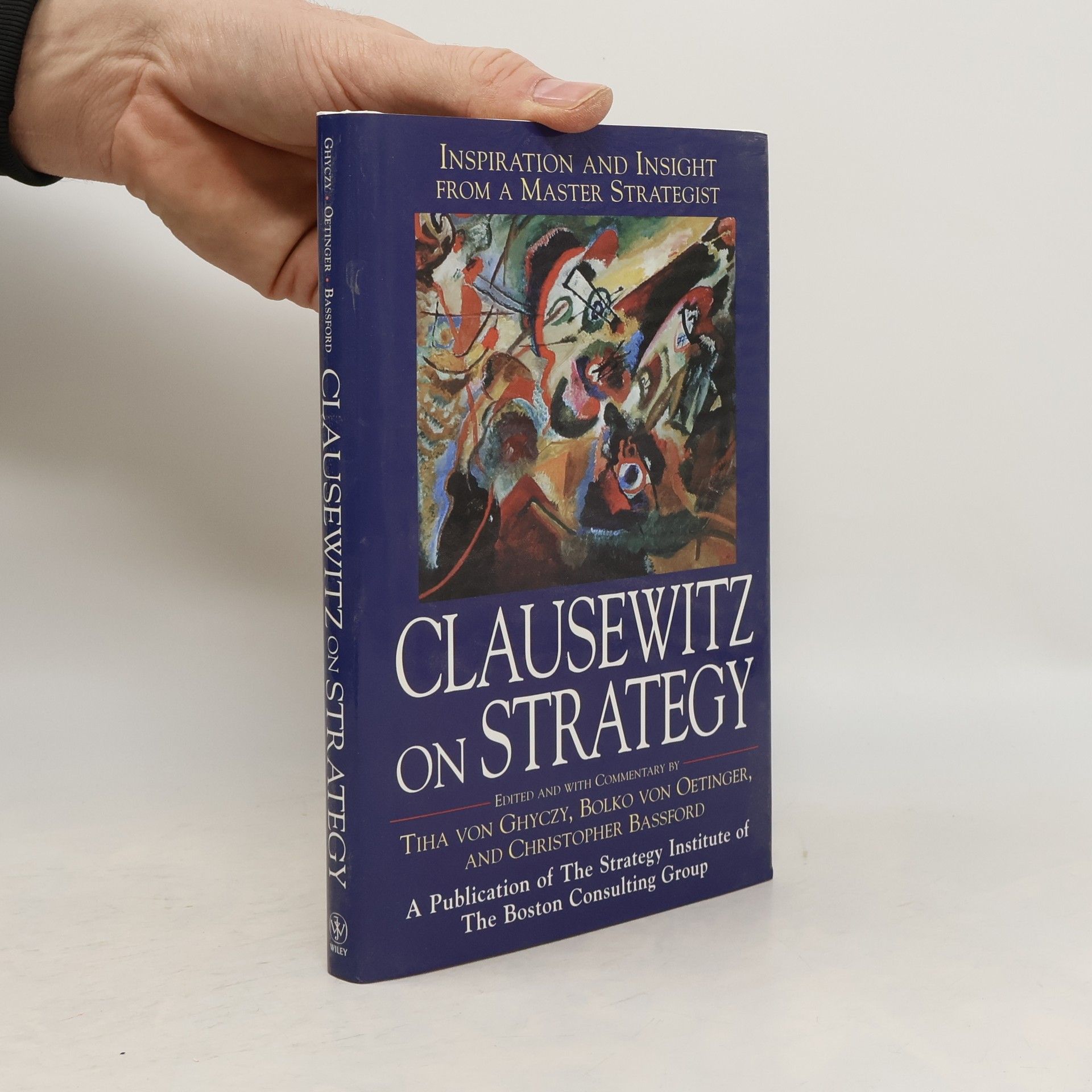Vom Kriege Band 2
- 392 pages
- 14 hours of reading
Carl von Clausewitz was a Prussian soldier, military historian, and theorist whose seminal work fundamentally shaped the understanding of warfare. His writings delve into the nature of conflict, emphasizing its intrinsic connection to political objectives and its inherent unpredictability. Clausewitz meticulously analyzed the interplay between military strategy and political aims, establishing foundational concepts that remain influential. His profound insights continue to inform strategic thinking and the study of armed conflict.







Der Krieg ist nichts als die fortgesetzte Staatspolitik mit anderen Mitteln. - Der Krieg ist ein erweiterter Zweikampf. Jeder sucht den andern durch physische Gewalt zur Erfüllung seines Willens zu zwingen. - Der Krieg ist ein Akt der Gewalt, und es gibt in der Anwendung der Gewalt keine Grenzen. - Menschenfreundliche Seelen könnten leicht denken, es gäbe ein Entwaffnen oder Niederwerfen des Gegners, ohne zu viel Wunden zu verursachen, und das sei die wahre Kriegskunst. Wie gut sich das auch ausnimmt, so muß man diesen Irrtum doch zerstören, denn in so gefährlichen Dingen, wie der Krieg eins ist, sind die Irrtümer, die aus Gutmütigkeit entstehen, gerade die schlimmsten. Wer sich der Gewalt rücksichtslos bedient, bekommt ein Übergewicht, wenn der Gegner anders handelt. So muß man die Sache ansehen, und es ist ein unnützes, sogar verkehrtes Bestreben, aus Widerwillen gegen das rohe Element die Natur des Krieges zu verkennen. [Textauszug]
Niniejsza praca w istotnym stopniu odbiega od innych dzieł Clausewitza. Nie jest to bowiem typowe dla tego wybitnego teoretyka wojskowości zwarte opracowanie poświęcone określonemu zagadnieniu. Analiza strategii to zbiór notatek Clausewitza, udostępnionych po jego śmierci przez żonę Carlowi von der Grbenowi i przygotowanych przez tegoż do wydania drukiem. Ten zaprzyjaźniony z autorem generał, podobnie jak on uczestnik wojen z napoleońską Francją, był później długoletnim adiutantem króla Prus Fryderyka Wilhelma IV oraz dowódcą różnych ugrupowań wyższego szczebla pruskiej armii. Przygotowując do druku spuściznę po Clausewitzu, von der Grben ograniczył się do jej uporządkowania i tylko w nielicznych wypadkach uzupełnił ją własnymi uwagami. Notatki te, które miały służyć Clausewitzowi do dalszych badań poświęconych historii wojskowości, są bardzo zróżnicowane pod względem dogłębności prezentowania danej kampanii: od zwięzłego, pozbawionego tła historycznego kalendarium wydarzeń aż po szczegółową analizę działań wojennych.
Covers the period of Napoleon's invasion of Egypt and focuses on the Second Coalition's campaign in Italy and their victories under Suvorov's dynamic leadership that carried the tide of battle up against the French frontier. This first English translation of volume 5 of Clausewitz's collected works conveys the character of Clausewitz's writing in all its registers.
The book reveals a previously suppressed commentary by Carl von Clausewitz, a prominent military theorist, on the Battle of Waterloo. Historian Peter Hofschröer presents this fresh perspective, challenging the notion that all insights on the battle have already been uncovered. Through Clausewitz's analysis, readers gain a deeper understanding of the strategic complexities and implications of this pivotal historical event.
"War is not merely a political act, but also a real political instrument, a continuation of political commerce, a carrying out of the same by other means." -Carl von Clausewitz, On War, 1832 On War is Carl von Clausewitz' masterpiece on war and military strategy, which was written between 1816 and 1830 and was published posthumously by his wife Marie von Clausewitz (née von Brühl) in 1832. Three main concepts of war stand out: war should be seen as an instrument of politics; the military objectives in war that support one's political objectives fall into two types: "war to achieve limited aims" and war to "disarm" the enemy; and the course of war will tend to favor the party with the stronger emotional and political motivations, but especially the defender. This edition is the classical translation of On War (1873) by Col. J.J. Graham, with an introduction and notes by Colonel F.N. Maude, published in three volumes. A must-read for military historians and theorists, policy makers, and anyone interested in understanding the philosophy and concepts of war.
A sharply-observed study of one of the major turning points in history. A superb first-hand account from an officer on the Russian Imperial Staff. Includes a detailed examination of the Battle of Borodino.
First translation into English of Clausewitz's most important campaign history, which offers key insights into his theoretical classic On War.
L'offensiva è l'elemento fondamentale della guerra. Lo dimostra in queste pagine un grandissimo teorico dell'arte militare, forse il più grande di tutti, Carl von Clausewitz. Questa antologia di brani tratti dal suo celeberrimo trattato "Della guerra", curata da uno dei massimi studiosi di storia militare, Gastone Breccia, è dedicata principalmente alle strategie offensive, sui campi di battaglìa e nella vita. Perché tutti noi siamo come piccoli Stati, determinati a raggiungere i nostri obiettivi anche a costo di metterci in contrasto con altri individui. E spesso ci troviamo costretti a "muovere guerra": è indispensabile tenere presenti allora le regole fondamentali che rispecchiano la natura stessa dei conflitti. Qui si rivelano tutta la genialità e l'attualità del grande teorico prussiano di inizio Ottocento. Nessuno ha saputo analizzare l'essenza e i caratteri della guerra con tale profondità, ed è per questo che leggere il suo testo, dopo duecento anni e in un mondo socialmente, politicamente e tecnologicamente così diverso, è di estremo interesse non solo per gli specialisti ma per chiunque si trovi a misurarsi con una situazione conflittuale. Il che, prima a poi, capita davvero a tutti.